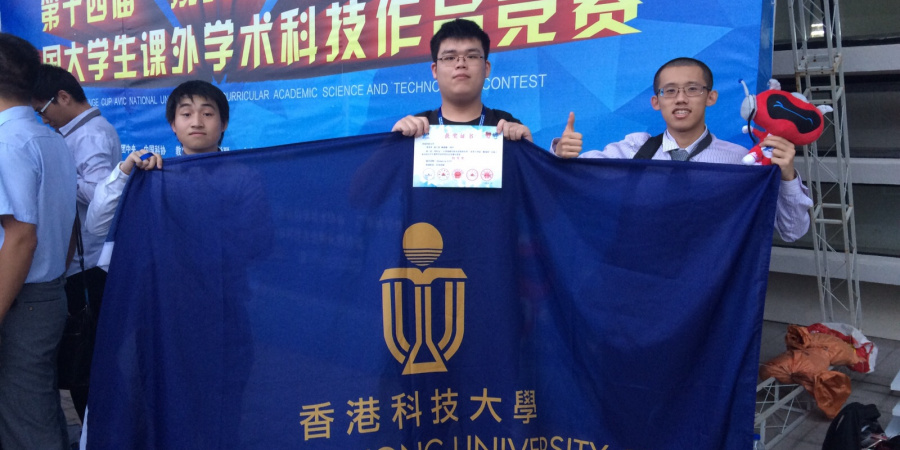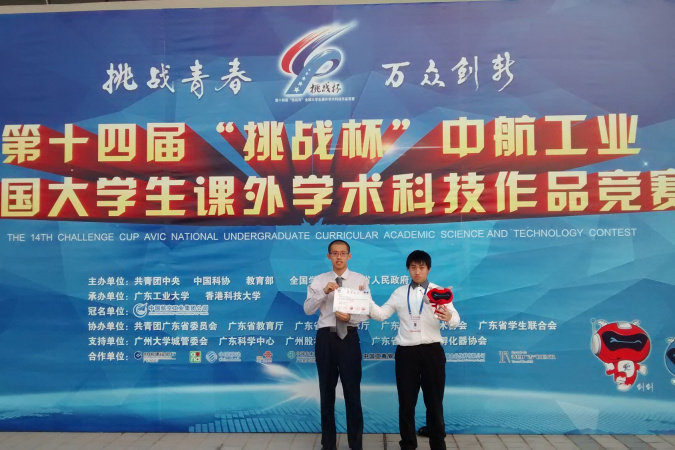Students Reaped Multiple Awards in 14th National Challenge Cup
Undergraduates Renjing Huang, Po Sang Lo and Chun Ki Yeung, all from Chemical and Biomolecular Engineering, won multiple awards in the 14th National Challenge Cup, including the Grand Prize in Grand Finals, the First Prize in Theme-based Competition on “Smart Green Cities”, and the Second Prize in Hong Kong Regional Competition.
Known as “The Olympiad for University Students”, the National Challenge Cup is considered one of the premier national competitions that pools together top young innovative minds from all of China. Out of 100,000 projects nationwide, only 738 were invited to attend the Grand Finals, which were held from 16 to 20 November 2015 in Guangzhou, China. Among those 738 projects, only 38 were awarded a Grand Prize, the highest award of the competition.
Under the supervision of Prof Tom Zhengtang Luo, the award-winning project “Graphene Membrane for Seawater Desalination” mainly aims to achieve an effective desalination process by using the graphene membrane that the team invented. The increasing scarcity of freshwater sources across the globe has urged the need to develop alternative water supplies. Reverse osmosis (RO) membranes are currently considered as more environmentally friendly and energy-efficient than the classical thermal desalination methods such as multistage flash. However, RO membranes suffer from low desalination capacity and high capital costs. This has urged the need for developing novel membranes, which can reduce the energy consumption of the RO process by showing high water permeability coupled with high salt rejection capacity.
In this project, the team designed and fabricated graphene-based membranes by the filtration-facilitated assembly technique. They also invented a prototype for seawater desalination to obviate the problems associated with prior arts, which include short service life, formation of biofilm and low permeate flux. Once successful, their device can produce clean water hundreds times faster than the traditional RO technology using the same amount of energy. It is anticipated that graphene membrane technology will play a proliferating role in seawater desalination.
The well-received project does not end with the competition. The team will carry on the project by expanding the fabrication of membranes from filtering small ions to filtering larger molecules. Specifically, a new membrane for biocompatibility is on their agenda. It is hoped the membrane can demonstrate a remarkable effect on bio-treatment such as body fluid purification. Once the membranes are successfully made, they will be installed on the team’s commercialized product and their performance will be tested outside the laboratory.
Other than this team, three groups of HKUST students also secured two Second Class Awards and a Third Class Award. Electronic and Computer Engineering undergraduate Xiyuan Liu won the Second Class Award for his project on “Remotely Operated Vehicle Based on Robot Operating System”. PhD student Zeng-shun Chen and undergraduate Hoi Yin Yung, both Civil and Environmental Engineering, won the Second Class Award for their project titled “A New Pressure-Aeroelastic Hybrid Wind Tunnel Test Device and Technique”. Undergraduates Xinzhu Liu, Dual Degree Program in Technology and Management, Zhiyu Chen, Finance, and Yangyang Duan, Division of Life Science, received the Third Class Award for their project on “Real-Time Display of Machine Status”.
The 14th National Challenge Cup was co-hosted by the Guangdong University of Technology (GDUT) and HKUST, and it is the first time in the Cup’s 25 years of history that a university from Hong Kong co-hosted the competition. It is a biennial event and was first hosted by Tsinghua University in 1989.
The newly-introduced Theme-based Competition of the National Challenge Cup was also hosted by HKUST. Under the theme of “Smart Green Cities”, students proposed creative ideas and innovative solutions to transform cities into smart green cities. More than 800 teams from Mainland China, Hong Kong and other countries including Russia, Thailand and Malaysia participated in the competition. The finals were held at HKUST in July 2015.
Related link:


